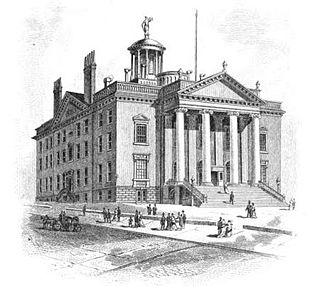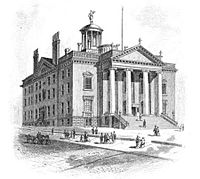Background
Under the provisions of the New York Constitution of 1821, 32 Senators were elected on general tickets in eight senatorial districts for four-year terms. They were divided into four classes, and every year eight Senate seats came up for election. Assemblymen were elected countywide on general tickets to a one-year term, the whole Assembly being renewed annually.
The previous session had been dominated by the controversy about the presidential succession, and the question how to choose presidential electors. Party lines broke down when Martin Van Buren tried to have the "Bucktails" faction of the Democratic-Republican Party [1] support William H. Crawford for U.S. president. A large part of the Bucktails favored John Quincy Adams, Henry Clay, Andrew Jackson and John C. Calhoun as possible presidential candidates, and proposed to have the presidential electors elected by the people in districts, similar to the congressional elections. The Anti-Crawford factions became known as the "People's Party", and they joined forces with the "Clintonians" (supporters of DeWitt Clinton, opposed to the Bucktails). The rump Bucktail faction (which followed Van Buren) was called the "Regency Party" by their opponents, a reference to the Albany Regency.
On April 3, a caucus of Bucktail legislators, consisting of the Regency men and a minority of People's men, nominated Canal Commissioner Samuel Young [2] for Governor; and Lt. Gov. Erastus Root for re-election.
On September 22, a State convention "in favor of a new electoral law", consisting of about 30 People's men and about 90 Clintonians, nominated Ex-Gov. DeWitt Clinton [3] for Governor, and Assemblyman James Tallmadge, Jr. (PP) for Lieutenant Governor.

The 23rd New York State Legislature, consisting of the New York State Senate and the New York State Assembly, met from January 28 to April 8, 1800, during the fifth year of John Jay's governorship, in Albany.

The 24th New York State Legislature, consisting of the New York State Senate and the New York State Assembly, met from November 4, 1800, to April 8, 1801, during the sixth year of John Jay's governorship, in Albany.

The 26th New York State Legislature, consisting of the New York State Senate and the New York State Assembly, met from January 25 to April 6, 1803, during the 2nd year of George Clinton's second tenure as Governor of New York, in Albany.

The 28th New York State Legislature, consisting of the New York State Senate and the New York State Assembly, met from November 6, 1804, to April 10, 1805, during the first year of Morgan Lewis's governorship, in Albany.

The 29th New York State Legislature, consisting of the New York State Senate and the New York State Assembly, met from January 28 to April 7, 1806, during the second year of Morgan Lewis's governorship, in Albany.

The 30th New York State Legislature, consisting of the New York State Senate and the New York State Assembly, met from January 27 to April 7, 1807, during the third year of Morgan Lewis's governorship, in Albany.

The 31st New York State Legislature, consisting of the New York State Senate and the New York State Assembly, met from January 26 to April 11, 1808, during the first year of Daniel D. Tompkins's governorship, in Albany.

The 32nd New York State Legislature, consisting of the New York State Senate and the New York State Assembly, met from November 1, 1808, to March 30, 1809, during the second year of Daniel D. Tompkins's governorship, in Albany.

The 36th New York State Legislature, consisting of the New York State Senate and the New York State Assembly, met from November 3, 1812, to April 13, 1813, during the sixth year of Daniel D. Tompkins's governorship, in Albany.

The 37th New York State Legislature, consisting of the New York State Senate and the New York State Assembly, met from January 25 to April 15, 1814, during the seventh year of Daniel D. Tompkins's governorship, in Albany.

The 38th New York State Legislature, consisting of the New York State Senate and the New York State Assembly, met from September 26, 1814, to April 18, 1815, during the eighth year of Daniel D. Tompkins's governorship, in Albany.

The 40th New York State Legislature, consisting of the New York State Senate and the New York State Assembly, met from November 5, 1816, to April 15, 1817, during the tenth year of Daniel D. Tompkins's governorship, and while John Tayler was Acting Governor, in Albany.

The 41st New York State Legislature, consisting of the New York State Senate and the New York State Assembly, met from January 27 to April 21, 1818, during the first year of DeWitt Clinton's governorship, in Albany.

The 42nd New York State Legislature, consisting of the New York State Senate and the New York State Assembly, met from January 5 to April 13, 1819, during the second year of DeWitt Clinton's governorship, in Albany.

The 43rd New York State Legislature, consisting of the New York State Senate and the New York State Assembly, met from January 4 to April 14, 1820, during the third year of DeWitt Clinton's governorship, in Albany.

The 44th New York State Legislature, consisting of the New York State Senate and the New York State Assembly, met from November 7, 1820, to April 3, 1821, during the fourth year of DeWitt Clinton's governorship, in Albany.

The 45th New York State Legislature, consisting of the New York State Senate and the New York State Assembly, met from January 2 to April 17, 1822, during the fifth year of DeWitt Clinton's governorship, in Albany.

The 46th New York State Legislature, consisting of the New York State Senate and the New York State Assembly, met from January 7 to April 24, 1823, during the first year of Joseph C. Yates's governorship, in Albany.

The 47th New York State Legislature, consisting of the New York State Senate and the New York State Assembly, met from January 6 to November 27, 1824, during the second year of Joseph C. Yates's governorship, in Albany.

The 49th New York State Legislature, consisting of the New York State Senate and the New York State Assembly, met from January 3 to April 18, 1826, during the second year of DeWitt Clinton's second tenure as Governor of New York, in Albany.


